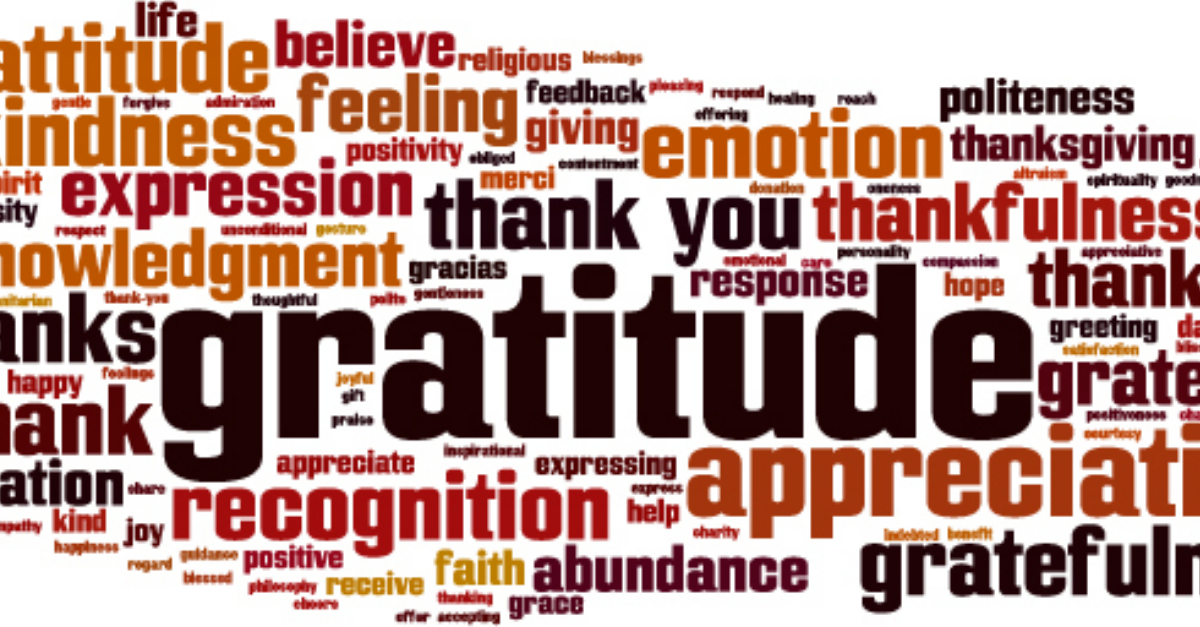 Dr. David Fawcett
Dr. David Fawcett
Gratitude, and the many means by which it can be practiced, is a powerful resource for anyone working to build emotional and physical resilience in their lives, whether in recovery from an addiction, struggling through a difficult period, or managing a physical illness. Robert Emmons[i] has studied gratitude extensively and found that its psychological benefits include experiencing more pleasure, feeling more emotionally awake, and overall experiencing more joy, satisfaction, and feelings of connection with other people. Perhaps more astounding, the practice of gratitude is also associated with profound physical improvements, including stronger immune systems, fewer aches and pains, lower blood pressure, better sleep, lower A1C (a measure of average blood glucose levels), and even significantly longer survival rates among persons living with chronic illnesses.[ii]
Many people confuse the practice of gratitude with the creation of a short list at the end of the day or a quickly-whispered thanks after some near-miss. While these certainly are acts of gratitude, the full benefits of gratitude are far better achieved by adopting what Brené Brown[iii] calls a shift in orientation or thinking. She notes that it is essential to move beyond the “attitude of gratitude” often cited in recovery groups by implementing actual behaviors. Behaviors are an essential component of the formula for achieving gratitude’s most powerful effects.
Gratitude is not a character trait that one either has or does not have; rather, it is a way of thinking and behaving that is expressed throughout the day in many different ways. Acts of gratitude are universally available and can be ritualized, such as a daily practice of reflection at the beginning or end of the day or even prayer itself. They can also be informal such as noticing the beauty of a plant, or the calming satisfaction of petting one’s dog or cat, or connecting with a memory of someone we love.
Incorporating an orientation of gratitude can be challenging. In my own experience, the moments when I really need gratitude’s soothing effects are the times that I find it most difficult to practice. I may be sad, angry, or feeling like a victim, with no impulse to release my discomfort by adopting a more positive way of thinking and behaving. While it is certainly important to identify and express all emotions, including negative ones, I have found that if I can re-orient myself at such times by consciously and actively reconnecting with an awareness of the gifts and blessings in my life rather than waiting for the mood to pass, I can quickly and very powerfully change my thinking. Gratitude is indeed a mood changer.
I believe the practice of gratitude is especially beneficial for anyone recovering from compulsive behaviors because it releases a burst of dopamine, the neurotransmitter that creates a feeling of well-being. Each of us has reward circuity built into our brain designed to give us “natural” rewards by releasing dopamine when we do something that helps us survive and benefit the species. For example, it makes us feel good to collaborate, eat good food, and have sex. Addictive behaviors and substances hijack this system by releasing much larger amounts of dopamine than we can achieve through natural rewards. In recovery, or when simply trying to live a healthy life, it is necessary to reset this system, and the practice of gratitude is a powerful tool in this process. It not only levels our emotions, it creates change in our relationships with others.
There are unlimited ways to practice gratitude. Studies have shown that journaling (with a pen and paper, not a computer) is a potent way to practice it. Other methods, such as counting one’s blessings, are also effective, as is maintaining a spiritual connection. There are countless other means, as well, such as noticing the small things, appreciating one’s own gifts and talents, and even finding the lessons in hard times. No matter how it is practiced, a shift in orientation toward gratitude is a gift that benefits us all.
* * * * * * * * * *
If you or someone you care about is struggling with compulsive sexual behavior, help is available. For sex addicts, Seeking Integrity offers a low-cost online workgroup series. Click HERE for information. We also offer a low-cost online workgroup to help addicts learn about healthy intimacy and sexuality. Click HERE for information.
[i]Emmons, R. A., & Mccullough, M. E. (2003). Counting blessings versus burdens: An experimental investigation of gratitude and subjective well-being in daily life. Journal of Personality & Social Psychology, 84(2), 377-389. doi:10.1037//0022-3514.84.2.377.
[ii]Ironson, G., Kremer, H., & Lucette, A. (2016). Relationship Between Spiritual Coping and Survival in Patients with HIV. Journal of General Internal Medicine, 31(9), 1068-1076. doi:10.1007/s11606-016-3668-4.
[iii]Brown, C. B. (2010). The gifts of imperfection: Let go of who you think you’re supposed to be and embrace who you are. Center City, MN: Hazelden.
